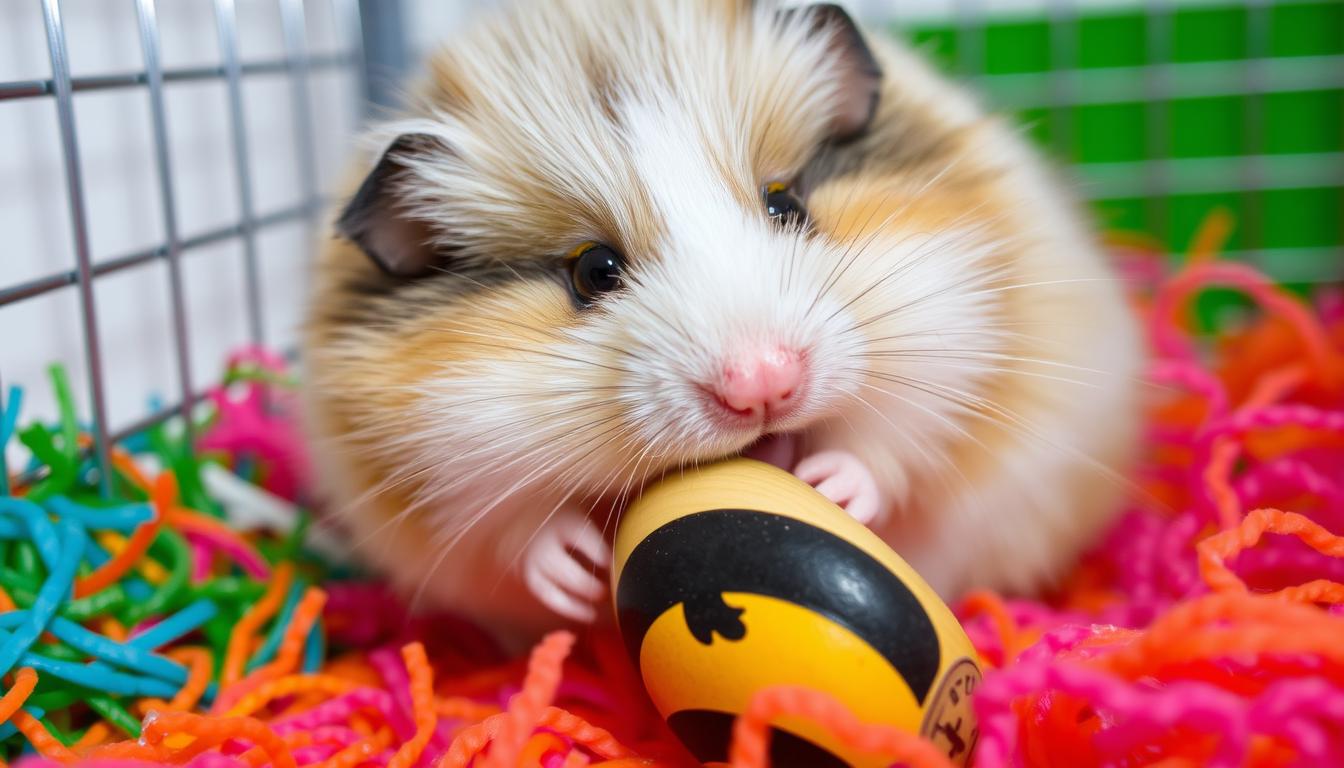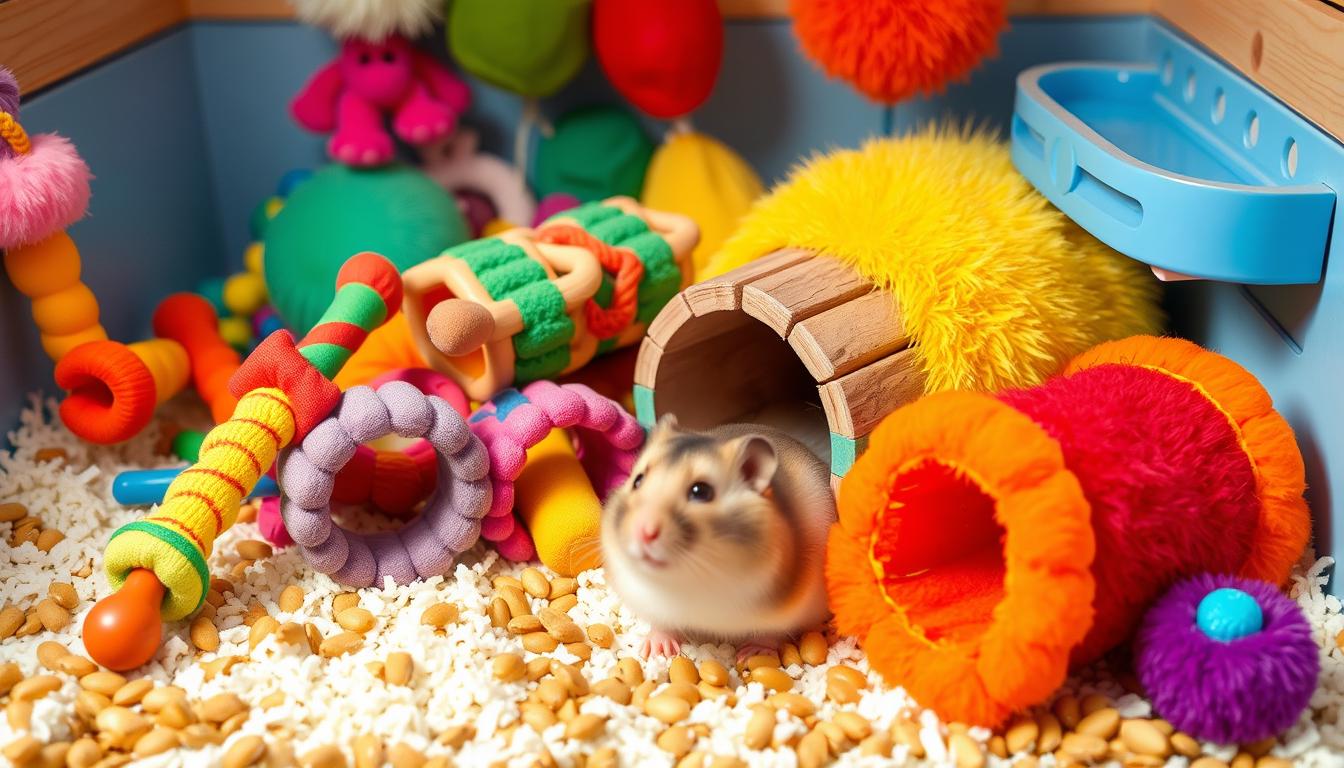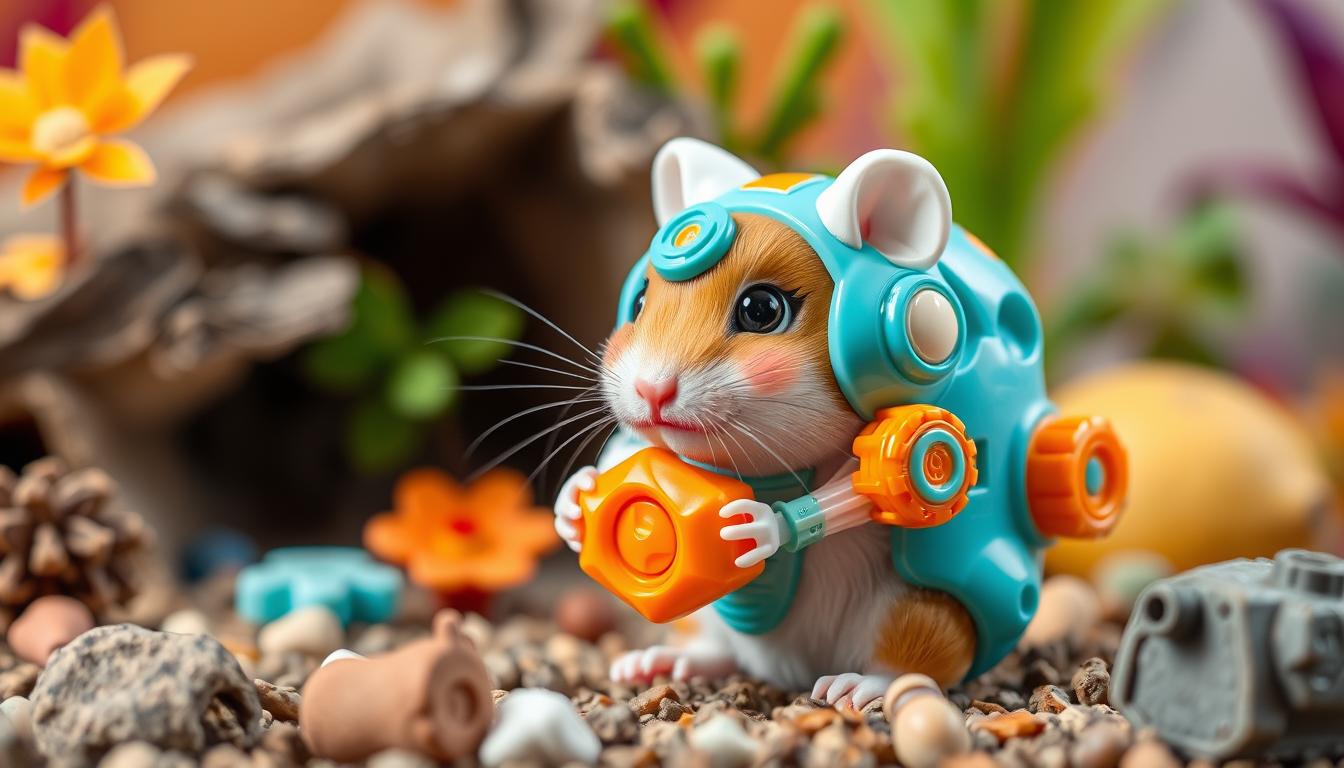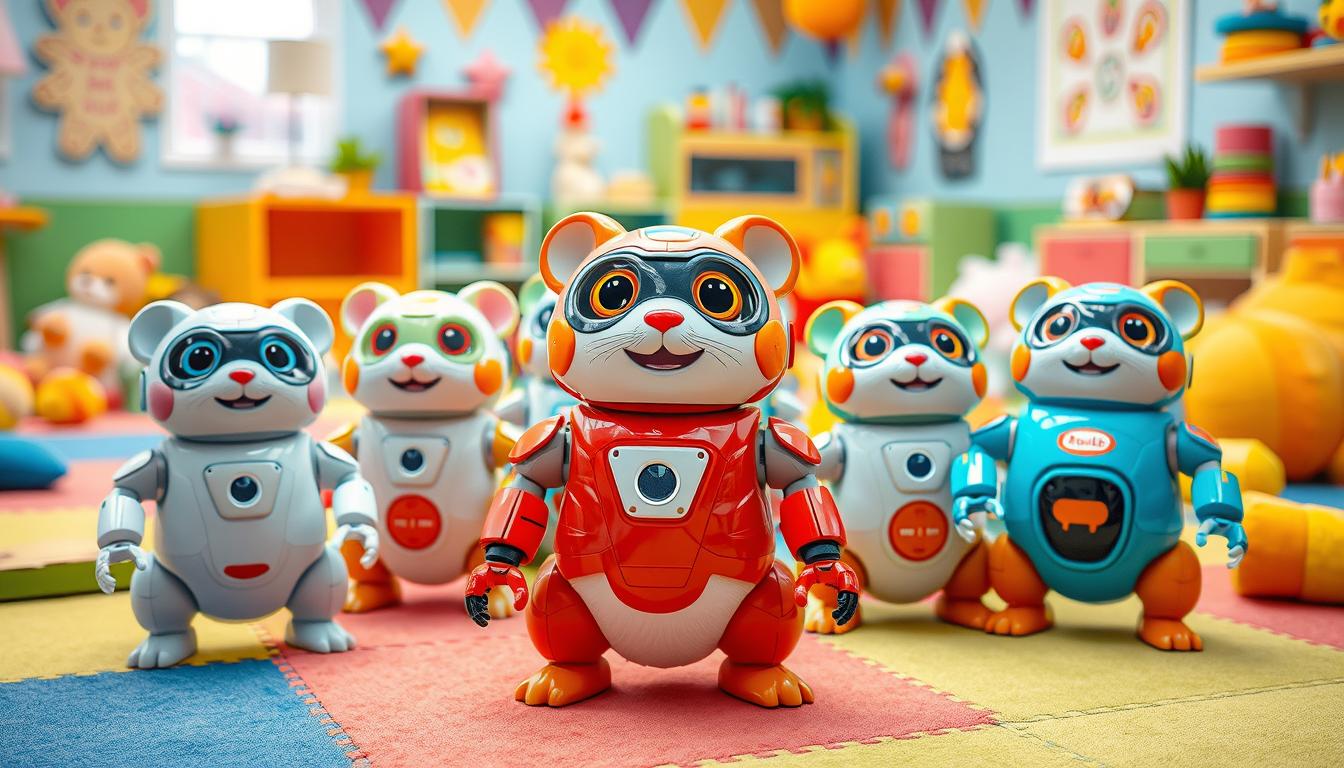Are your hamster’s teeth causing you concern? We have the solution to keep their teeth healthy and happy. Our guide covers safe gnaw toys, from natural wood to commercial options. We’ll show you how to meet your hamster’s chewing needs and keep their teeth in top shape.
Key Takeaways
- Understand the importance of gnawing for hamsters’ dental health and overall well-being
- Explore a variety of safe and engaging chew toy options, including wooden toys and chew sticks
- Learn how to choose the right size and material of gnaw toys for your specific hamster breed
- Discover tips for introducing new toys and maintaining your hamster’s chewing tools
- Ensure your hamster’s dental health and keep them entertained with the right gnaw toys
Understanding the Importance of Gnawing for Hamsters
Hamsters have a natural urge to chew, which is key for their health. Gnawing helps keep their teeth in good shape and stops them from getting too long. This is important to avoid overgrown teeth.
Why Hamsters Need to Gnaw
Hamsters’ teeth grow all the time. Without gnawing, their teeth can grow too long. This can cause eating problems, pain, and even serious health issues. Gnawing helps keep their teeth healthy and in the right shape.
Benefits of Gnawing for Teeth and Health
Gnawing is good for more than just teeth. It keeps your hamster’s dental health in top shape. Chewing on the right toys helps wear down their teeth. It also meets their instinct to chew, which can make them less stressed and bored.
- Maintains proper tooth length and shape
- Prevents overgrown teeth and dental issues
- Satisfies natural chewing instincts and reduces stress
- Provides mental stimulation and enrichment
“Providing your hamster with suitable gnaw toys is crucial for their long-term dental health and overall well-being.”
Types of Safe Hamster Gnaw Toys
It’s important to give your hamster the right wooden chew toys, edible chew treats, and safe chewing materials. This is key for their dental health and happiness. There are many options, from natural and durable to convenient commercial products. Let’s look at the different types of gnaw toys that can make your hamster happy and healthy.
Wooden Toys: Natural and Durable Options
Wooden toys are great for hamsters because they let them gnaw naturally. Choose toys made from untreated, non-toxic woods like apple, willow, or pine. These materials are safe for your pet to chew on and last a long time.
Chew Sticks: Easy and Fun for Your Pet
Chew sticks, made from compressed timothy hay or other edible plants, are also a good choice. They’re fun for your hamster to chew on and give them important nutrients and fiber. This helps support their health.
Commercial Gnaw Toys: What to Look For
When picking commercial wooden chew toys or edible chew treats, make sure they’re made for hamsters. Look for toys from safe, non-toxic materials that fit your pet’s size and age.
- Avoid toys with small parts that could pose a choking hazard.
- Choose toys that allow your hamster to engage in natural chewing behaviors.
- Consider toys that provide both mental and physical stimulation.
By adding a variety of safe and fun gnaw toys to your hamster’s space, you can help keep their teeth healthy. You’ll also meet their natural urge to chew.
Choosing the Right Gnaw Toys for Your Hamster
Choosing the right gnaw toys is key for your hamster’s dental health and happiness. Size and material are important. Let’s look at how to pick the best toys for your furry friend.
Size Considerations for Different Breeds
Hamsters come in different sizes, depending on their breed. Dwarf hamsters need small toys, while Syrian hamsters need bigger ones. Make sure the toys fit your hamster’s size for safe chewing.
Materials to Avoid in Hamster Toys
Stay away from harmful materials in toys. Avoid:
- Plastic – Can be toxic if ingested
- Metals – Can hurt your hamster’s teeth and gums
- Soft woods – Can splinter and be a choking hazard
Choose natural, untreated wood, hay, or safe chewing materials. These will let your hamster chew safely and healthily.
By picking the right size and material for gnaw toys, your hamster will have a fun and safe chewing time. This keeps their teeth healthy and avoids future problems.
| Hamster Breed | Ideal Gnaw Toy Size | Safe Chewing Materials |
|---|---|---|
| Dwarf Hamsters | Small | Untreated wood, hay, cardboard |
| Syrian (Golden) Hamsters | Large | Untreated wood, hay, cardboard |
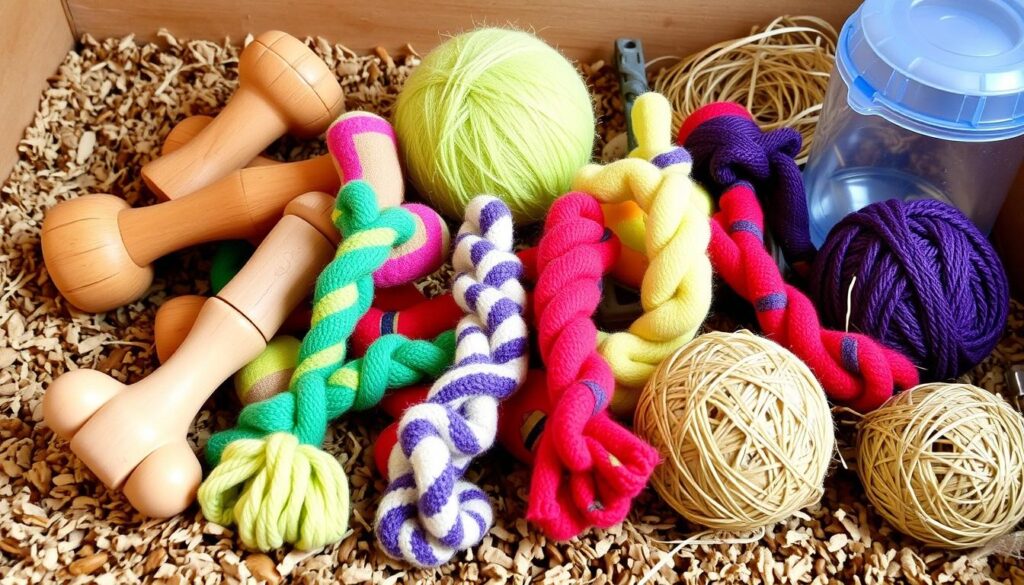
“Providing your hamster with the right size and type of gnaw toys is essential for their dental health and overall well-being.”
How to Introduce Gnaw Toys to Your Hamster
Introducing new gnaw toys to your hamster can be fun for both of you. Knowing when your hamster is ready and using the right tips helps. This way, you can make the transition smooth and support their natural chewing.
Signs Your Hamster Is Ready for New Toys
Watching your hamster’s behavior can tell you a lot. Look for signs like teeth grinding, burrowing, or less play with old toys. These signs mean your hamster wants new things to chew on.
Tips for Encouraging Your Hamster to Chew
Here are some tips to get your hamster to chew on new toys:
- Start with one new toy and see how your hamster reacts. Add more toys slowly to avoid overwhelming them.
- Put the new toys where your hamster likes to hang out. This makes them easy to find and interesting.
- Put a little bit of their favorite treat on or near the toys. This will make them curious and want to chew.
- Change your hamster’s toys often to keep them excited and prevent boredom.
By following these tips and watching your hamster, you can make introducing new toys a success. This will keep them happy and fulfilled.
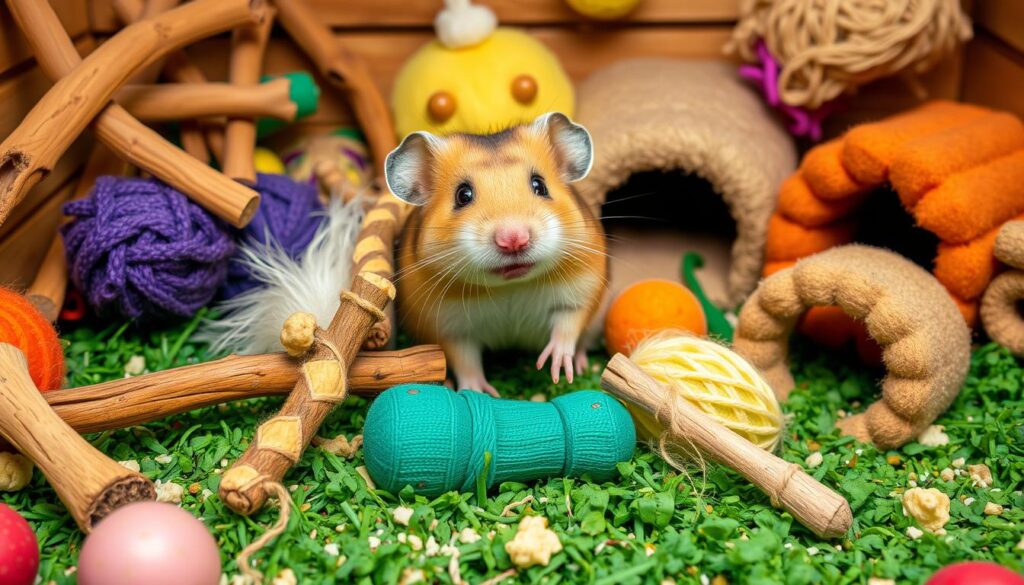
Maintaining and Replacing Gnaw Toys
It’s key to keep your hamster’s chewing toys in good shape. This is for their dental health and happiness. Even the toughest toys can wear out, so watch for signs and replace them when needed.
When to Replace Gnaw Toys
Check your hamster’s toys often for wear or damage. Look for cracks, splinters, or chewed-down areas. These can be harmful. Also, swap out toys if your hamster loses interest. This means they’re not fun anymore.
Cleaning Your Hamster’s Gnawing Toys
Cleaning toys is vital for your hamster’s safety and health. Use a mild, pet-safe cleaner. Make sure to rinse well and let them dry before giving them back to your hamster. This keeps their play area clean and free from bacteria.

